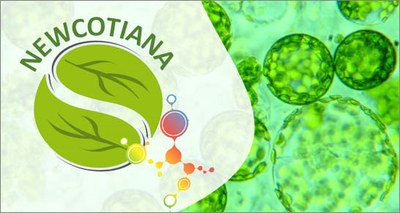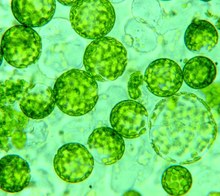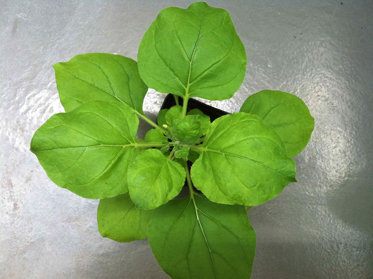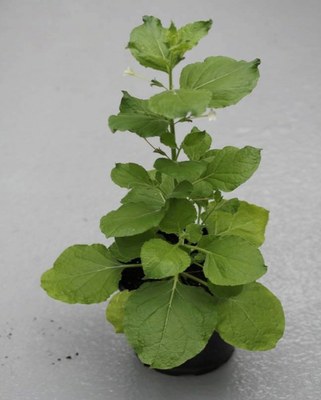Coronavirus: From wild tobacco new perspectives in the treatment of COVID-19
23/4/2020
ENEA among the 4 research centers of the international consortium funded by the EU and coordinated by the Australian Queensland University
 Developing vaccines and biopharmaceuticals against the virus responsible for COVID-19 through DNA sequencing of the wild tobacco plant. An international consortium coordinated by the Queensland University of Technology in Brisbane (Australia) comprising 4 research centers [1], including ENEA, has made available to the world scientific community engaged in the fight against coronavirus the decoded genome of Nicotiana benthamiana, a plant native from Australia widely used in biopharmaceuticals manufacturing (e.g. against Ebola), a branch of biotechnology known as molecular farming. The study was conducted as part of the project Newcotiana, funded by the European Horizon 2020 program- comprising 19 partners- with over 7 million euro.
Developing vaccines and biopharmaceuticals against the virus responsible for COVID-19 through DNA sequencing of the wild tobacco plant. An international consortium coordinated by the Queensland University of Technology in Brisbane (Australia) comprising 4 research centers [1], including ENEA, has made available to the world scientific community engaged in the fight against coronavirus the decoded genome of Nicotiana benthamiana, a plant native from Australia widely used in biopharmaceuticals manufacturing (e.g. against Ebola), a branch of biotechnology known as molecular farming. The study was conducted as part of the project Newcotiana, funded by the European Horizon 2020 program- comprising 19 partners- with over 7 million euro.
 “We have been releasing the genome sequence to all teams employing molecular farming to combat the COVID-19 pandemic, in the hope to accelerate the discovery of new biopharmaceuticals and the fight against the virus. As is customary with unpublished data, we ask the teams to keep us updated on their progress and to give us priority in publishing a comprehensive genome analysis, research coordinator Peter Waterhouse at the Queensland University of Technology pointed out. "Obtaining a high-quality genomic sequence of Nicotiana benthamiana is a necessary prerequisite for understanding and optimizing the genes that control the quantity and quality of the biopharmaceutical compounds produced in this plant," Waterhouse said.
“We have been releasing the genome sequence to all teams employing molecular farming to combat the COVID-19 pandemic, in the hope to accelerate the discovery of new biopharmaceuticals and the fight against the virus. As is customary with unpublished data, we ask the teams to keep us updated on their progress and to give us priority in publishing a comprehensive genome analysis, research coordinator Peter Waterhouse at the Queensland University of Technology pointed out. "Obtaining a high-quality genomic sequence of Nicotiana benthamiana is a necessary prerequisite for understanding and optimizing the genes that control the quantity and quality of the biopharmaceutical compounds produced in this plant," Waterhouse said.
"The European Union-funded project Newcotiana is using gene editing in Nicotiana Benthamiana as a tool for the production of useful biopharmaceuticals. When we started the project two years ago, SARS-COV-2 was not on the horizon; however, since the outbreak of the pandemic, several project teams have started working on the production of biopharmaceuticals helpful against the virus, from reagents to prepare rapid immunological tests, to molecules to be used as adjuvants in a mass vaccination program ", Diego Orzaez, researcher at the CSIC of Valencia and coordinator of the project Newcotiana concluded.
 Currently numerous public and private research teams are working to develop diagnostic reagents and vaccines to combat this pandemic. But one of the main difficulties is large quantity production at a low cost. This problem could be addressed using plants as actuall biofactories, a research sector in which ENEA has a long-standing commitment.
Currently numerous public and private research teams are working to develop diagnostic reagents and vaccines to combat this pandemic. But one of the main difficulties is large quantity production at a low cost. This problem could be addressed using plants as actuall biofactories, a research sector in which ENEA has a long-standing commitment.
In fact, large quantities of plants can be grown employing simple agricultural technologies available in developing countries, which don’t have sophisticated biopharmaceutical production methods such as those that employ animal cell cultures. Furthermore, Nicotiana benthamiana doesn’t present problems of even accidental contamination of the food chain, being an inedible plant.
The Nicotiana benthamiana genome sequence is available at: https://nbenth.com
For more information please contact:
Giovanni Giuliano, ENEA - Sustainability of Territorial Productive Systems Department, giovanni.giuliano@enea.it
Video of the Queensland University of Technology: vimeo.com
Project Newcotiana: newcotiana.org
[1] Queensland University of Technology (QUT), ENEA, Consejo Superior de Investigaciones Cientificas (CSIC) and Milan University “La Statale”.

